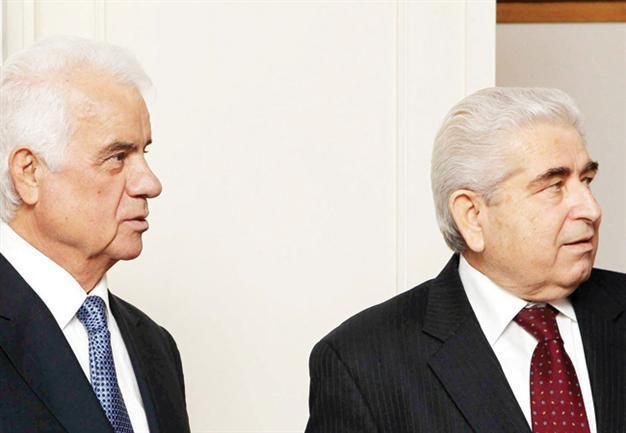Avoid confrontation, US tells Cyprus parties
ANKARA - Hürriyet Daily News

Greek Cypriot President Demetris Christofias (R) stands next to Turkish Cypriot leader Derviş Eroğlu during their meeting at the UN controlled buffer zone in Nicosia. AFP photo
Turkey and Greek Cyprus must avoid any provocations that endanger the region’s fragile balance amid the latter’s move to conduct energy exploration, Washington has said ahead of the U.N. secretary-general’s decision on the future of Cypriot reunification talks.Possible provocations include issuing more oil exploration and drilling licenses on Greek Cyprus’ part, which would deepen the country’s ties with Israel, and statements about the possible annexation of Turkish Cyprus by Turkey or a push for Turkish Cypriot independence on Turkey’s part. The message was delivered to both sides during recent political talks by senior U.S. officials, the Hürriyet Daily News has learned. The Cyprus issue was on the agenda when the U.S. and Turkish foreign ministers met April 1 in Istanbul.
U.N. Secretary-General Ban Ki-moon is expected to announce his conclusion on the long-running negotiations between Turkish and Greek Cyprus, and there is little hope that he will invite the parties to attend an international conference where a settlement would be imposed by the world community. Greek Cyprus will assume the term presidency of the European Union on July 1; Turkey has already announced that it will suspend its relations with the EU presidency during the second half of 2012 if there is no solution beforehand. Ankara’s position was backed by the Turkish Cypriot government, which declared that it would not continue talks if Greek Cyprus assumes the EU presidency unilaterally.
‘Delaying peace is a provocation’
“Our expectation from the international community and the U.S. is that they will use their influence over Greek Cyprus and Greece to reach an agreement before July 1. They should understand that delaying the achievement of peace and a settlement on the island is itself a provocative move,” a senior Turkish official told the Daily News on the condition of anonymity.
Turkey accuses Greek Cypriot leader Demetris Christofias of trying to postpone the talks to mid-2013 because he will be running for a second term as president in elections slated for February 2013. However, because Turkey’s arguments are being overlooked, there is unlikely to be pressure placed on Greek Cyprus to hold the talks sooner.
Washington’s warning comes at a time when both the Turkish and Turkish Cypriot press are frequently reporting on potential “Plan B” scenarios for Cyprus, including changing the name of the Turkish part of the Island to the State of Turkish Cyprus, as stated in the Annan Plan of 2004, and seeking international recognition for the territory.
All options are on the table in the event that U.N.-sponsored reunification talks fail, a Turkish Cypriot official told the Daily News, citing Turkish Cypriot leader Derviş Eroğlu’s recent remarks on the issue. In January, Eroğlu said that if a solution could not be achieved on the island, the Turkish Cypriot government would establish a new constitution, new laws and a new name. Possible new names include the “Northern Cyprus Turkish State,” or “Northern Turkish State,” Eroğlu said.
The reunification talks are not open-ended, President Abdullah Gül said yesterday. “I hope those talks will yield results, but they cannot go on like this forever.”
Israeli-Greek Cypriot rapprochement moving ahead
In the meantime, the rapprochement process between Israel and Greek Cyprus will likely gain new impetus with Israeli Foreign Minister Avigdor Lieberman’s upcoming, three-day visit to the island.
Lieberman will meet with Christofias; Foreign Minister Erato Kozakou-Marcoullis; Commerce, Industry and Tourism Minister Neoclis Sylikiotis and opposition chief Nicos Anastassiades. Among the issues on the table will be “promoting a plan to form a regional emergency aid force.”
In February, Israeli Prime Minister Benjamin Netanyahu made a landmark visit to Cyprus for talks with Christofias that focused on energy cooperation and economic ties. The two countries also signed an agreement to coordinate on maritime search and rescue operations.
Israel and Greek Cyprus have discovered huge natural gas deposits beneath the Mediterranean Sea between the two countries and have tentatively discussed cooperating on delivering gas to European and Asian markets.
















